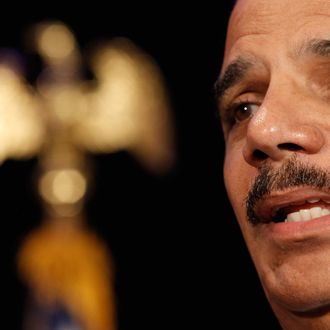
Apart from Obama’s “the private sector is doing fine” semi-gaffe yesterday, the political news cycle this week was largely dominated by bickering over the recent spate of national security leaks, including news of the president’s terrorist “Kill List” and the Iranian cyber-assault he ordered. Republicans, who thought the revelations were suspiciously pro-Obama, blamed 1600 Pennsylvania Avenue, while the administration has strongly denied any role in the debacle. Yesterday, at a hastily scheduled press briefing, Obama declared his “zero tolerance” policy for such leaks, and forcefully stated that such disclosures had not come from the White House: “The notion that my White House would purposely release classified national security information is offensive,” he said. “It’s wrong.” But with Republicans and Democrats still baying for blood, Attorney General Eric Holder turned to the U.S. Attorneys for the District of Columbia (Ronald Machen) and Maryland (Rod Rosenstein) to figure out who is responsible.
In a statement to issued to reporters, Holder assured the public that the two will be given free range, and are “fully authorized to prosecute criminal violations,” as well as follow any leads they find in the Legislative and Executive branches. (According to the Washington Post, prosecutors from the Justice Department’s National Security Division will also work on the investigation.) Holder continued:
The unauthorized disclosure of classified information can compromise the security of this country and all Americans, and it will not be tolerated. The Justice Department takes seriously cases in which government employees and contractors entrusted with classified information are suspected of willfully disclosing such classified information to those not entitled to it, and we will do so in these cases as well.
Meanwhile, analysts (including one in today’s New York Times, which, it is important to note, provided a venue for many of the the stories in question) say that that Machen, Rosenstein, and their team will have their work cut out for them. In today’s analysis of the news, the paper pointed out (accurately, we think) that “many people are surprised to learn that there is no law against disclosing classified information, in and of itself.” While those who do can be punished or (more likely) fired, leaks have to be prosecuted under “a 1917 espionage statute whose principal provision makes it a crime to disclose, to persons not authorized to receive it, national defense information with knowledge that its dissemination could harm the United States or help a foreign power.” Apparently, this has only happened once — in 1984.
Additionally, because the information came to light as a result of deeply reported projects — including books — which often involve hundreds of interviews, zeroing in on a single leaker can prove difficult (though the modern paper trails left by e-mail and other digital communication make it easier to determine whether or not someone spoke to a reporter.” Basically, as Steve Aftergood of the Project on Government Secrecy with the Federation of American Scientists put it, “That is a challenging assignment and it explains why there have been relatively few prosecutions over the years.” Stay tuned (for a while.)
This post has been updated throughout.





























